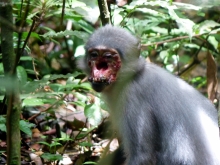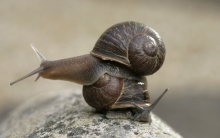
Men and women remember pain differently
Scientists increasingly believe that one of the driving forces in chronic pain—the number one health problem in both prevalence and burden—appears to be the memory of earlier pain. Research published today in Current Biology suggests that there may be variations, based on sex, in the way that pain is remembered in both mice and humans.

Wild African monkeys are infected with the bacterium causing yaws in humans
By Katherine Gombay

Nuclear pasta, the hardest known substance in the universe
A team of scientists has calculated the strength of the material deep inside the crust of neutron stars and found it to be the strongest known material in the universe.
Matthew Caplan, a postdoctoral research fellow at McGill University, and his colleagues from Indiana University and the California Institute of Technology, successfully ran the largest computer simulations ever conducted of neutron star crusts, becoming the first to describe how these break.

Carbon reserves in Central American soils still affected by ancient Mayan deforestation
Deforestation is suspected to have contributed to the mysterious collapse of Mayan civilization more than 1,000 years ago. A new study shows that the forest-clearing also decimated carbon reservoirs in the tropical soils of the Yucatan peninsula region long after ancient cities were abandoned and the forests grew back.

“Citizen Science” field observations yield updated predicted distributions for rare species
Online “citizen science” data initiatives may be able to help map the distribution of rare species in the wild, according to a study published August 8 in the open access journal PLOS ONE by Yifu Wang of McGill University and colleagues.

Chirality switching in biomineral structures
Researchers at McGill University have discovered a mechanism by which helical biomineral structures can be synthesized to spiral clockwise or counterclockwise using only either the left-handed or right-handed version of a single acidic amino acid.

Billion-year-old lake deposit yields clues to Earth’s ancient biosphere
A sample of ancient oxygen, teased out of a 1.4 billion-year-old evaporative lake deposit in Ontario, provides fresh evidence of what the Earth’s atmosphere and biosphere were like during the interval leading up to the emergence of animal life.

Products derived from plants offer potential as dual-targeting agents for experimental cerebral malaria
Malaria, a life-threatening disease usually caused when parasites from the Plasmodium family enter the bloodstream of a person bitten by a parasite-carrying mosquito, is a severe health threat globally, with 200 to 300 million cases annually and 445,000 deaths in 2016.

How viruses disarm the immune system
How do viruses that cause chronic infections, such as HIV or hepatitis C virus, manage to outsmart their hosts’ immune systems?
The answer to that question has long eluded scientists, but new research from McGill University has uncovered a molecular mechanism that may be a key piece of the puzzle. The discovery could provide new targets for treating a wide range of diseases.

McGill research team studies how calcium compounds accumulate in the arteries
Team leader Marta Cerruti, using the tools of the Canadian Light Source, has examined the mineralized arteries of genetically modified laboratory mice and found that the pathway in the body that leads to what laypeople call “hardening of the arteries” is not what medical experts previously assumed.

Epigenetic alteration of a vitamin B12 processing gene shines new light on our understanding of rare diseases
Rare hereditary recessive diseases were thought to be expressed in offspring only when both parents carry a mutation in the causal gene, but a new study is changing this paradigm. An international research team led by scientists at the University of Lorraine in France along with McGill University and the Research Institute of the McGill University Health Centre (RI-MUHC) in Canada discovered a new cause of a rare condition known as cblC, that they named “epi-cblC”.

A greener way to make ketones
Researchers at McGill University have discovered a new, more environmentally friendly way to make ketones, an important chemical ingredient in pharmaceuticals. While ketones are found in a wide range of useful chemicals, they are commonly prepared through energy-intensive, multi-step technologies that create significant chemical waste. In an article published online last month in Nature Chemistry, the McGill scientists demonstrate how carbon monoxide, a widely available b

Canadian brain bank network to advance research on Alzheimer’s disease
More than 400,000 Canadians aged 65 and over live with diagnosed dementia, including Alzheimer’s disease, which accounts for approximately 70 percent of cases. The cause of this degenerative brain disease is largely unknown and no effective treatment exists. The disease has a devastating effect on individuals and their families.

A ‘hot Jupiter’ with unusual winds
The hottest point on a gaseous planet near a distant star isn’t where astrophysicists expected it to be – a discovery that challenges scientists’ understanding of the many planets of this type found in solar systems outside our own.

New technique for finding life on Mars
Researchers demonstrate for the first time the potential of existing technology to directly detect and characterize life on Mars and other planets.

